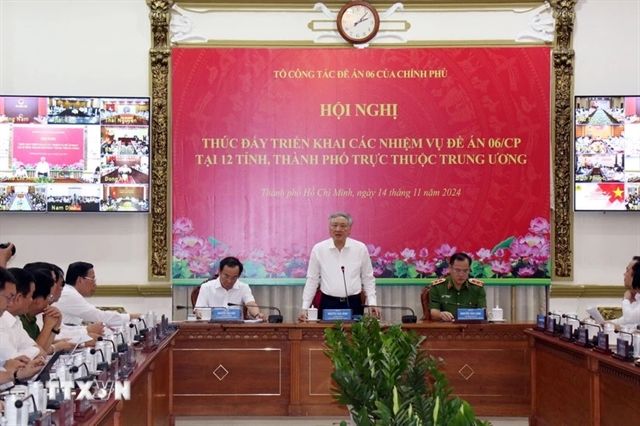 Society
Society

 |
| Dr Cù Văn Trung, Director of the Institute for Policy Research and Social Issues. — Photo baoquocte.vn |
General Secretary Tô Lâm's article lays out a vision for Việt Nam’s development, positioning digital transformation as essential to the nation’s future. Addressing challenges from globalisation and rapid technological change, he called for enhanced economic competitiveness and a workforce equipped for the digital age.
The Thế giới&Việt Nam (The World and Việt Nam Report) newspaper interviewed Dr Cù Văn Trung, Director of the Institute for Policy Research and Social Issues, for further insights into these issues.
How significant do you consider General Secretary Tô Lâm's statement on the digital revolution? In your view, what is the core message he aims to convey?
General Secretary Tô Lâm’s message to society represents the Party’s new approach to contemporary challenges. His article specifically highlights how the Fourth Industrial Revolution is transforming national infrastructure, reshaping societal foundations, and driving significant growth in both the economy and social structures.
The General Secretary presents a vision of a new era, where Việt Nam reaches new heights. Through his speeches and writings, he has set out the aspirations and objectives of a nation poised for progress, reflecting the hopes of the Vietnamese people. This vision promises prosperity, development, and a future where Việt Nam stands among the world’s most developed nations, embodying the collective ambition, resolve and effort of the entire nation.
What is your perspective on Việt Nam’s current digital transformation?
The digital transformation in Việt Nam is currently making its mark across nearly every sector of the economy and society. Efforts from government agencies, local authorities and industries have ensured steady progress in terms of policy, strategy, and financial investment. This is a positive sign, indicating that the entire political system is involved in the process.
However, on a broader national scale, Việt Nam's digital transformation has yet to fully meet expectations. While it has gained significant traction in urban areas and among the younger, more progressive population, the majority of Vietnamese people are still not fully prepared or actively participating in the digital transition.
In your opinion, what are the biggest challenges Việt Nam faces in its digital transformation process?
The biggest challenge Việt Nam faces in its digital transformation is the ability to adapt and integrate these changes. Our economy currently reflects our capabilities, and the majority of the population has acquired skills through decades of educational reforms. In essence, our abilities are aligned with our current stage of development. Consequently, the challenge of digital transformation in Việt Nam can be compared to 'carrying a heavy load'.
The capacities of our economy, citizens and government are still limited, particularly in a process that demands a solid socio-economic foundation. A higher level of readiness would significantly accelerate the success of digital transformation. This transformation involves digitising the economy, establishing a digital government for administrative tasks, and creating a fully digital society across all sectors. Our capabilities in these areas are not yet strong enough, making this a considerable challenge for Việt Nam’s digital transformation.
 |
| A banking digital transformation forum in May. — VNA/VNS Photo |
Which sectors should Việt Nam prioritise for investment to drive breakthroughs in the digital revolution? What specific policies should the government introduce to accelerate the digital transformation?
In my view, education should be the primary focus for investment. It serves as a crucial link between the past, present and future, equipping the next generation with the right mindset and skills to turn the nation's aspirations into reality.
In the digital transformation process, the most vital factor is still the people. As often stated, the digital revolution is, in essence, a revolution in governance – a reform of institutions. What we are witnessing now is a gradual process of reform, where outdated barriers that hinder progress are being dismantled by the Party and government over time.
Technology and innovation play a key role in this process, evolving in tandem with global trends. Việt Nam acknowledges the importance of this issue, and various policies and strategies have already been put in place. Numerous programmes are being rolled out, and many ministries, sectors and localities are actively and resolutely driving these initiatives forward.
What breakthroughs does Việt Nam need in terms of policy, technology and human resources to realise the digital revolution?
There has been considerable discussion on various theoretical frameworks and strategies to drive breakthroughs in the digital revolution. Scholars and experts have explored these topics in numerous seminars and scientific forums. Crucially, the Party, the State and experts have all recognised the digital revolution's pivotal role in shaping our future. With the world advancing rapidly, we cannot afford to lag behind.
Our science and technology policies are already comprehensive and well-structured. The legal framework supporting digital transformation has been designed to streamline the process and make it more accessible. However, there remains a need for greater focus on policies that attract top talent, improve the work environment, and ensure competitive compensation for professionals in high-tech fields, especially in artificial intelligence.
In practice, Việt Nam faces a significant shortage of high-quality human resources in science, technology and innovation. To address this, it is essential to create an environment that encourages talent to work and contribute to society. We must provide the younger generation, especially students, with the opportunities, resources and incentives necessary for success – competitive salaries, benefits and a supportive work environment are key factors in attracting and retaining this talent.
Moreover, targeted investment in leading institutions, such as universities and relevant ministries, is crucial for research and development in scientific and technological fields. Clear goals must be established, with specific budget allocations and mechanisms to engage international experts and attract overseas Vietnamese talent to train and develop specialists in key areas. This will help build the human resources needed for Việt Nam to lead in the digital age and establish replicable models of success.
With the leadership of the Party, the unity of the people, and the full engagement of the political system, we are confident that Việt Nam will succeed in realising its digital revolution. By advancing productive forces and improving production relations, we will usher the nation into a new era of prosperity. — VNS




